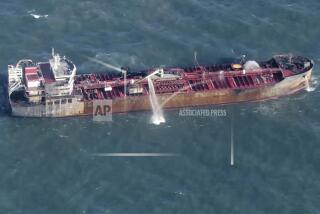Russian oil tanker spill said to cause ‘ecological catastrophe’
- Share via
PORT KAVKAZ, RUSSIA — More than 30,000 birds and countless fish have been killed in an “ecological catastrophe” wrought by thousands of tons of oil from a tanker that broke apart in a heavy storm near the Black Sea, the governor of the region said Monday.
Birds weighed down by thick coatings of the fuel oil hopped weakly along the shore or sat helplessly in the sand. Workers with pitchforks and shovels started the backbreaking labor of gathering up vast clumps of oil mixed with sand and seaweed.
The Russian tanker was one of as many as 10 ships that sank or ran aground in the storm Sunday in the strait connecting the Black Sea and the Sea of Azov. The bodies of three sailors from a freighter that also broke apart washed ashore Monday, and rescuers were looking for five missing crewmen, Emergency Situations Ministry spokesman Sergei Kozhemyaka said.
The spill from the oil tanker was seen as potentially the worst environmental disaster in the region in recent years. It prompted criticism that many Russian tankers aren’t seaworthy.
“The damages are so great that it’s hard to assess. It can be equated with an ecological catastrophe,” said Alexander Tkachev, governor of the Krasnodar region, according to the Interfax news agency.
Russian President Vladimir V. Putin ordered Prime Minister Viktor Zubkov to fly to the region to assess the disaster and cleanup efforts.
Three freighters, including the one with the missing sailors, spilled sulfur into the sea. But Russian officials said the sulfur did not appear to pose any environmental danger.
The Volganeft-139 tanker was carrying about 1.3 million gallons of fuel oil when the storm sundered it. About half its load had leaked out, officials estimated. The craft’s 13 crew members were rescued.
Alexei Knizhnikov, head of the World Wildlife Federation’s Russian oil and gas program, said the Volganeft-139 was unfit to endure severe weather at sea.
Anatoly Yanhuck, a regional coast guard officer, said workers would begin pumping the remaining oil from the tanker once the weather improved.
More to Read
Sign up for Essential California
The most important California stories and recommendations in your inbox every morning.
You may occasionally receive promotional content from the Los Angeles Times.













